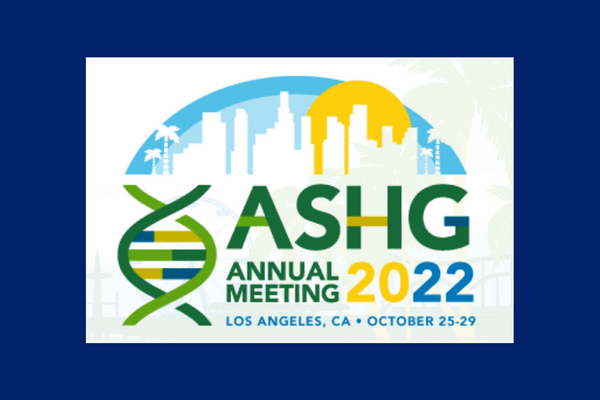Duke at American Society of Human Genetics Annual Meeting

The American Society of Human Genetics (ASHG) annual meeting is the largest human genetics and genomics meeting and exposition in the world. It provides a forum for presenting and discussing cutting-edge science in all areas of human genetics.
The meeting will be held October 25-29 in Los Angeles, California. Several Duke faculty and trainees will participate:
Speakers and Moderators
Shyamalika Gopalan, PhD, postdoctoral fellow, Goldberg Lab
Moderator: Platform - Leveraging population genetics to inform diverse cohorts and biobanks
Apoorva Iyengar, Graduate Student, Reddy lab
Moderator: Platform - Splicing together the story
Andrew Landstrom, MD, PhD, Associate Professor of Pediatrics
Co-moderator: Platform - Understanding GWAS signals: From variants to function
Yi-Ju Li, PhD, Professor of Biostatistics & Bioinformatics
Moderator: Platform - Molecular investigations into disease mechanisms
Riley Mangan, Graduate Student, Lowe Lab
Platform Presenter: Adaptive sequence divergence forged new neurodevelopmental enhancers in humans
Platform Topic: How do we express ourselves? Examining promoter and enhancer biology
Alejandro Ochoa, PhD, Assistant Professor of Biostatistics & Bioinformatics
Moderator: Platform - Populations evolving: Modeling genetic variation to understand evolutionary processes
Megan Ramaker, PhD, postdoctoral researcher, Shah lab
Moderator: Platform - Genetic impacts on the epigenome and beyond
Tim Reddy, PhD, Associate Professor of Biostatistics & Bioinformatics
Co-moderator: Plenary - Featured Plenary Abstract Session II
Liuyang Wang, PhD, Assistant Research Professor of Molecular Genetics and Microbiology
Platform presenter: Leveraging human genetic variation and single cell RNA-seq to reveal the catalog of influenza-induced splicing QTLs
Platform Topic: Context matters! Tissue, cell type, and condition-specificity of epigenetics and expression
Poster Presentations
Lexi Bounds, Graduate Student, Gersbach lab
Using single cell CRISPR/dCas9-based regulatory element screening to dissect complex genetic loci.
Ornit Chiba-Falek, PhD, Professor in Neurology
Integrative single-nucleus multi-omics analysis identified candidate regulatory elements and variants and their target genes in Alzheimer's disease brains
Rachel Holmes, Statistician II, SSRI, DPRI
How are APOE4, changes in weight/BMI, and longevity related? Insights from a Causal Mediation Analysis
Zhuoran Hou, MD, Research Assistant, School of Medicine
Genetic association models are robust to common population kinship estimation biases
Angela Jones, Graduate Student, Ko lab
Sex differences in gene expression affect host response to influenza A infection
Boris Kantor, PhD, Associate Research Professor of Neurobiology
An allele- discriminative approach for efficient and specific CRISPR/Cas9 based gene therapy of Late Onset of Alzheimer's disease
Rachel Keener, Graduate Student, Ko Lab
Human genetic variation reveals regulators of Yersinia pestis cellular Infection.
Jong ok La, Biostatistician, DMPI
Differentiate association and causal effects of cardiovascular disease risk factors on Alzheimer’s disease and its age-at-onset.
Han Kyu Lee, PhD, Assistant Research Professor in Molecular Genetics and Microbiology
A cross-species approach using an in vivo evaluation platform in mice demonstrates that sequence variation in the human RABEP2 gene modulates ischemic stroke outcomes.
Xuejun Qin, Biostatistician, DMPI
Application of the colorectal cancer polygenic risk score to the VA CSP #380 “Prospective Evaluation of Risk Factors for Large (≥1cm) Colonic Adenomas in Asymptomatic Subjects” longitudinal colonoscopy screening cohort
Megan Ramaker, PhD, postdoctoral researcher, Shah lab
A pipeline for predicting pathogenicity of monogenic cardiovascular disease genetic variants.
Dahlia Rohm, Graduate Student, Gersbach lab
Targeted activation of the imprinted PWS locus via CRISPR/Cas9-based epigenome editing
Laavanya Sankaranarayanan, Graduate Student, Reddy lab
Functional characterization of polycystic ovary syndrome-associated risk loci identifies genetic regulatory regions
Benjamin Schott, Graduate Student, Ko Lab
Single-cell genome-wide association reveals a nonsynonymous variant in ERAP1 confers increased susceptibility to influenza virus.
Abanish Singh, PhD, Assistant Professor of Psychiatry and Behavioral Sciences
Gene-by-stress interaction in Alzheimer's disease risks.
Kari Strouse, Graduate Student, Reddy lab
Defining the effects of noncoding genetic variation on human regulatory element activity
Svetlana Ukraintseva, PhD, Associate Research Professor in the Social Science Research Institute
Vaccinations against pneumonia
Anatoli Yashin, PhD, Research Professor in the Social Science Research Institute
Calcium signaling in Alzheimer’s disease: Insights from PTK2B and miR146a interaction analyses.